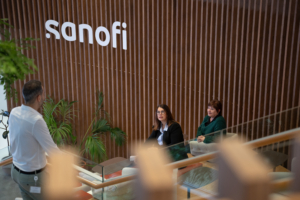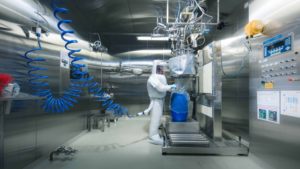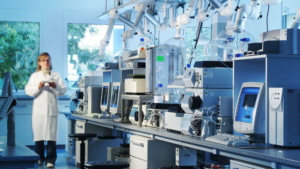Across the blood-brain barrier with ultrasound
CarThera's ultrasound device opens a gate for therapeutic molecules into the brain, study shows.
Low-intensity pulses of ultrasound are able to disrupt the blood-brain-barrier (BBB) temporarily to increase the delivery of the chemotherapeutic drug carboplatin to distinct brain areas of glioblastom patients. Interim results of a phase I/IIa study with 15 patients published in the journal Science Translational Medicine showed that the implantable ultrasound device SonoCloud from the Paris based company CarThera is safe and well tolerated.
SonoCloud is a 11.5 mm device, which is implanted in the skull bone in the extradural space near the patient’s tumour. Glioblastoma usually progress after two months of treatment with carboplatin. But in the study, one of the 15 patients showed no tumour progression after four months on the study, which was started at the Greater Paris University Hospital in July 2014 and not designed to prove efficacy of the ultrasound device.
The blood-brain barrier is one of the last major frontiers of neuroscience, said Alexandre Carpentier, a neurosurgeon at Pitié-Salpêtrière Hospital and the inventor of the SonoCloud device and founder of CarThera. Made of especially tightly juncted endothelial cells to keep bacteria, viruses and toxic molecules out of the brain, the barrier is also a hurdle too high for most drugs. Finding a way to safely open it, would enable new therapeutic possibilities for a wide range of brain diseases, including psychological disorders, cancer and neurodegenerative diseases like Alzheimer’s.
Ultrasound could be the door opener. According to CarThera, two minutes of low intensity ultrasound emission is enough to open the blood brain barrier for a duration of six hours and to increase by five to seven times the concentration of therapeutic molecules delivered into the brain. We plan to raise money in 2017 to fund a large-scale phase 2b/3 clinical trial in 200 patients with centres in Europe and the US, said Frédéric Sottilini, CEO of CarThera, a 2010 spin-off from the Greater Paris University Hospitals and the Pierre and Marie Curie University, based at the Brain and Spine Institute in Paris. SonoCloud could be commercially available in 2020 for use in recurrent glioblastoma; with CE marking and FDA approval obtained in the meantime. At the same time, the company will carry out exploratory studies in other indications, including Alzheimer’s disease.
250,000 patients worldwide are diagnosed with a brain tumour each year, according to the company’s estimates. SonoCloud may be helpful for about 160,000 of them with primary brain cancers and some brain metastases of other cancers. It has a market value of €1.5 billion.
© european-biotechnology-news.com/sk


 ©FabienMalot
©FabienMalot Lonza Group
Lonza Group Vetter Pharma
Vetter Pharma